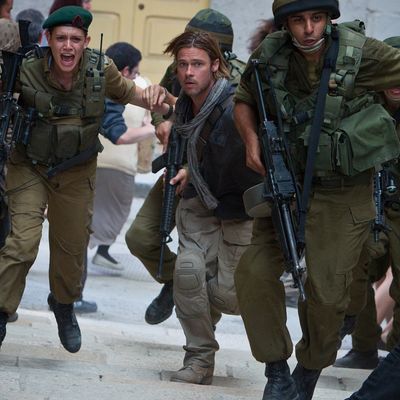
“Oh, no, not another goddamn zombie movie,” you’re probably muttering. But this isn’t just any zombie movie. It’s World War Z, based on a 2006 novel by Max Brooks that’s anything but back-to-the-old-grindhouse.
In his book, Brooks begins with the zombie-cannibal-plague conceit devised in Night of the Living Dead by George A. Romero (whom Brooks lauds in his acknowledgements) and goes on to trace its evolution from multiple distinct vantages: a series of interviews with survivors, each touching on a different mode of coping with life on a ghoul-ridden planet. Like so much good sci-fi, World War Z is a funhouse extrapolation from the world we know: Brooks’s zombie onslaught throws existing international tensions (especially in the Middle East) into bloody relief. I’d guessed it would be a monstrous challenge to adapt — that getting so many perspectives onscreen while creating a multiplex-friendly narrative arc would entail sacrifices. What I couldn’t have guessed was that among those sacrifices would be the whole fucking novel.
It’s just another goddamn zombie movie.
True, for the first twenty minutes and change, it’s an amazing one. The opening sequence is better than anything director Marc Forster has ever done: a Philadelphia traffic jam that goes from ho-hum to hellacious in the course of a family’s game of 20 Questions. One minute, ex–United Nations investigator Gerry Lane (Brad Pitt), his wife, Karen (Mireille Enos), and their two young daughters are goofing around; the next, there are explosions and crashes and people tearing other people apart. It’s the Saving Private Ryan version of Romero’s “They’re coming to get you, Barbara.” The zombies are lethal blurs, but you feel their bite: The sequence is cut and scored — howls, the crunch of metal and bone, the peculiar jawbone death rattle of the undead — like nothing I’ve seen. Forster’s movies (Monster’s Ball, Quantum of Solace, The Kite Runner) are usually choppy and rhythmless, but his regular editor Matt Chesse is joined here by Roger Barton, who worked dark magic on those wolf attacks in The Grey. This single sequence does the work of hundreds of others. It’s such a primal violation that you can believe every city on Earth could have fallen as fast.
Almost as fast is how quickly World War Z becomes World War ZZZZZZ. There is but one protagonist and he’s a dullard. Under normal circumstances, you would be forgiven for thinking that Pitt appropriated the property (à la Tom Cruise) for his own megalomaniacal ends, but the actor has appeared in enough ensemble pictures (and worked with enough dreamy auteurs like Terrence Malick) to dispel the idea that his vanity pushed out other considerations. My hunch is that Pitt and his team tried it Brooks’s way and couldn’t make it work, and so went back — with tons of money having already been spent — to what they knew: One hero, one arc, one overriding motivation. Gerry’s sole aim is to protect his wife and kids. This is what drives him and his family to his old U.N. employer, Thierry (Fana Mokoena), who gives them refuge on a convoy in the middle of the ocean, and on his own to Africa and the Middle East — because if he doesn’t lead the search for the pandemic’s Patient Zero, his girls will have to go to a landlocked refugee compound with the rest of us mortals. For a star like Pitt, there could be no prospect more nightmarish than having his family not being treated as if they’re special.
I had a sinking feeling when Gerry told Karen he was going to lead a team to Africa, and she registered wifely dismay that he would reup with the U.N.: “Don’t you remember what this job did to you?” It’s admirable that she would continue to think about how pressureful her husband’s job used to be and how much his daughters need a father who’s more emotionally available. But having just seen their city go up in flames and everyone they know on Earth either turned into a zombie cannibal or devoured by one, she might be expected to take the longer view. But big-budget disaster movies need to foreground the personal. So Gerry is in total synch with his wife. It was a stretch when the hero (Cruise, oddly enough) of Spielberg’s underrated War of the Worlds put reuniting his children with his wife ahead of everything else, but there at least the point was that he was just a guy. He wasn’t at the forefront of the war to save the planet (which of course would include his own family).
There are many, many actors in World War Z, but apart from Enos I have a hard time recalling them. (I registered David Morse, Matthew Fox, and Peter Capaldi because we’d bonded elsewhere.) Apparently none of the four credited screenwriters could come up with much besides Pitt going here and running from zombies and there and running from zombies and somewhere else and running from zombies. The final section in a medical compound — reportedly reshot at great cost — is tense and well-edited, and there are some terrifically creepy shots of individual zombies (a bug-eyed woman who looks like a walking shrunken head, a cawing-clucking-clacking former scientist who looks like Steve Buscemi with gangrene), but the premise for the sequence is as dumb as anything in a Grade Z slasher picture. You expect more invention at these prices.
For an actor with limited histrionic resources, Brad Pitt has taken a lot of chances in his career. Recently, he has been impressive in The Tree of Life, Moneyball, and Killing Me Softly. But without a character, he’s back to that soft, appraising, Robert Redford Jr. stare, his mouth half open as if he’s about to speak but plainly with nothing on his mind apart from, “This is what a movie star looks like without any lines.” The ghouls are having deeper thoughts.





